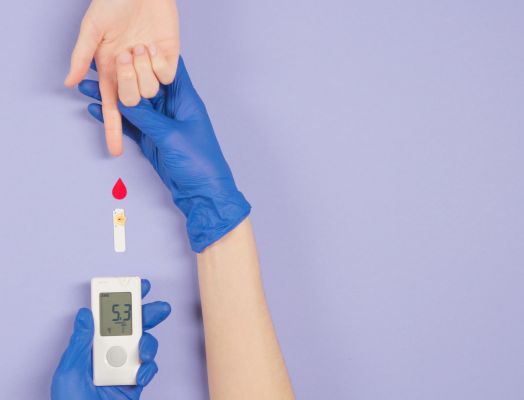When Should You Visit a Diabetes Doctor?

Diabetes is one of the fastest-growing chronic health conditions in India, affecting millions silently before symptoms even show. While lifestyle changes and general physicians play a role in managing early signs, timely consultation with a diabetes doctor in Faridabad can make a critical difference in long-term health outcomes. Knowing when to seek expert advice is the first step toward managing or even preventing complications.
Understanding the Role of a Diabetes Doctor
A diabetes doctor—often referred to as a diabetologist or endocrinologist—specializes in diagnosing and managing all types of diabetes: Type 1, Type 2, gestational diabetes, and prediabetes. These specialists go beyond symptom control; they help patients maintain a healthy quality of life through careful monitoring, treatment adjustments, and long-term planning.
Unlike a general practitioner, a diabetes doctor is well-versed in hormonal imbalances, insulin resistance, and metabolic issues that may be contributing to the condition. They are trained to handle complex cases and complications that often require a multi-pronged approach involving medication, lifestyle changes, and regular evaluations.
Early Signs You Shouldn’t Ignore
Many people with diabetes are asymptomatic during the initial stages. However, certain signs are red flags that your blood sugar levels may be out of balance:
- Excessive thirst and frequent urination
- Constant fatigue or weakness
- Blurred vision or recurring headaches
- Slow-healing wounds, especially on feet
- Sudden weight loss without trying
- Increased hunger despite eating regularly
- Tingling or numbness in hands and feet
These symptoms may seem minor individually, but together they could point to developing or uncontrolled diabetes. Don’t ignore them—early action can prevent complications down the line.
Who Should Proactively Visit a Diabetes Specialist?
You don’t always need to wait for symptoms. People who fall into certain risk categories should consider regular check-ups with a specialist:
- Those with a family history of diabetes
- Overweight or obese individuals
- People over 45 years of age
- Women with a history of gestational diabetes
- Patients diagnosed with polycystic ovarian syndrome (PCOS)
- People with high blood pressure or high cholesterol
- Anyone with sedentary lifestyle habits
For these groups, an annual screening and preventive guidance from a diabetes doctor can help manage the condition or delay its onset.
What Happens During a Consultation?
A first visit to a diabetes specialist is more comprehensive than a routine check-up. You can expect:
- Review of Medical and Family History
- Detailed Symptom Analysis and Physical Examination
- Blood Tests: Fasting blood glucose, HbA1c, and possibly lipid profiles
- Foot and Eye Checks for signs of early nerve or retinal damage
- Treatment Planning: Including medication, insulin therapy (if needed), and lifestyle interventions
- Nutrition & Exercise Counseling tailored to your health goals
Depending on the severity, follow-up visits may be scheduled every few weeks to a few months.
How a Diabetes Doctor Adds Value
While general doctors can diagnose diabetes, specialists bring a deeper level of understanding, particularly for:
- Treatment-resistant diabetes
- Frequent fluctuations in blood sugar
- Complications like kidney dysfunction or neuropathy
- Managing diabetes during pregnancy
- Co-management of related hormonal disorders
They also coordinate with dietitians, ophthalmologists, cardiologists, and foot care experts to offer a 360-degree care plan.
Complications That Can Be Avoided
Poorly managed diabetes can quietly affect multiple organs, leading to:
- Heart disease and stroke
- Chronic kidney disease
- Diabetic retinopathy and vision loss
- Non-healing ulcers or infections
- Amputations due to nerve damage
These complications are often irreversible. However, most can be prevented with early medical intervention and regular monitoring by a specialist.
When Emergency Care Is Needed
Sometimes, diabetes symptoms demand immediate attention. Seek urgent care if you experience:
- Sudden vision loss
- Confusion, dizziness, or loss of consciousness
- Extremely high blood sugar levels (hyperglycemia)
- Frequent hypoglycemic episodes (low sugar)
- Chest pain, irregular heartbeat, or shortness of breath
These may be signs of a diabetic crisis or associated cardiovascular condition and should not be ignored.
Tips for Managing Diabetes at Home
While a doctor provides guidance, day-to-day care plays an equally crucial role. Some home practices include:
- Monitoring blood sugar levels daily
- Following a diabetic-friendly diet rich in fiber and low in refined carbs
- Staying physically active with doctor-approved routines
- Limiting alcohol and quitting smoking
- Keeping a log of symptoms, sugar levels, and triggers
Using this information, your specialist can tailor your treatment more effectively.
Conclusion
Whether you’ve been recently diagnosed, are at high risk, or have been living with diabetes for years, consistent and specialized care can make all the difference. A diabetes doctor in Faridabad can help you not just manage the disease, but also lead a healthier, longer, and more balanced life.
Don’t wait until complications develop. Take charge of your health today—because early action is the best treatment of all.


